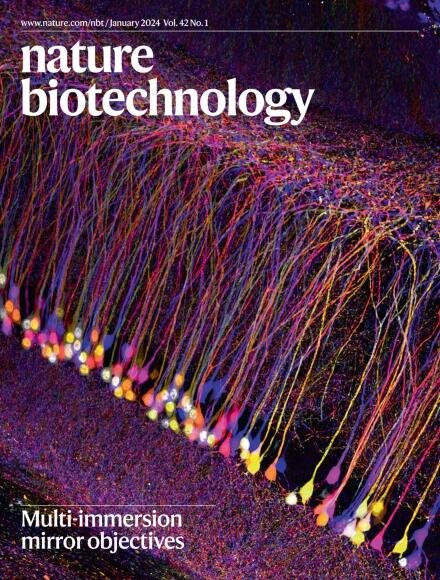Design of optimized epigenetic regulators for durable gene silencing with application to PCSK9 in nonhuman primates.
IF 41.7
1区 生物学
Q1 BIOTECHNOLOGY & APPLIED MICROBIOLOGY
引用次数: 0
Abstract
Epigenetic editing is a promising strategy for modifying gene expression while avoiding the permanent alterations and potential genotoxicity of genome-editing technologies. Here we designed optimized epigenetic regulators (EpiRegs) by testing combinations of transcription activator-like effector (TALE)-based and catalytically deactivated Cas9 (dCas9)-based epigenetic modification effectors and fusion protein structures. TALE-based EpiReg (EpiReg-T) achieved a final efficiency of 98% in mice, surpassing the initial dCas9-based efficiency of 64%. We demonstrated the approach in macaques by introducing DNA methylation and histone modifications to inhibit proprotein convertase subtilisin/kexin type 9 (PCSK9) expression, thereby lowering low-density lipoprotein cholesterol levels. A single dose of EpiReg-T delivered with lipid nanoparticles achieved efficient (>90%) and long-lasting (343 days) silencing of PCSK9 in the liver. Integrative multiomic analyses revealed minimal off-target effects in EpiReg-T-treated monkeys, mice and human-derived cells. EpiReg can be redirected to other genes by reengineering the DNA-binding domain. Our findings represent a step toward the clinical application of epigenetic editing for the treatment of human diseases.非人类灵长类动物PCSK9持久基因沉默的优化表观遗传调控设计。
表观遗传编辑是一种很有前途的策略,可以修改基因表达,同时避免基因组编辑技术的永久改变和潜在的遗传毒性。在这里,我们通过测试基于转录激活因子样效应物(TALE)和基于催化失活Cas9 (dCas9)的表观遗传修饰效应物和融合蛋白结构的组合,设计了优化的表观遗传调控物(EpiRegs)。基于tale的EpiReg (EpiReg- t)在小鼠体内的最终效率为98%,超过了最初基于dcas9的64%的效率。我们通过引入DNA甲基化和组蛋白修饰来抑制蛋白转化酶枯草素/ keexin 9 (PCSK9)的表达,从而降低低密度脂蛋白胆固醇水平,在猕猴中证明了这种方法。单剂量的epiregt与脂质纳米颗粒一起递送,在肝脏中实现了高效(>90%)和持久(343天)的PCSK9沉默。综合多组学分析显示,在epiregg -t治疗的猴子、小鼠和人类来源的细胞中,脱靶效应最小。通过重组dna结合域,EpiReg可以被重定向到其他基因上。我们的发现代表了表观遗传编辑在临床应用中治疗人类疾病的一步。
本文章由计算机程序翻译,如有差异,请以英文原文为准。
求助全文
约1分钟内获得全文
求助全文
来源期刊

Nature biotechnology
工程技术-生物工程与应用微生物
CiteScore
63.00
自引率
1.70%
发文量
382
审稿时长
3 months
期刊介绍:
Nature Biotechnology is a monthly journal that focuses on the science and business of biotechnology. It covers a wide range of topics including technology/methodology advancements in the biological, biomedical, agricultural, and environmental sciences. The journal also explores the commercial, political, ethical, legal, and societal aspects of this research.
The journal serves researchers by providing peer-reviewed research papers in the field of biotechnology. It also serves the business community by delivering news about research developments. This approach ensures that both the scientific and business communities are well-informed and able to stay up-to-date on the latest advancements and opportunities in the field.
Some key areas of interest in which the journal actively seeks research papers include molecular engineering of nucleic acids and proteins, molecular therapy, large-scale biology, computational biology, regenerative medicine, imaging technology, analytical biotechnology, applied immunology, food and agricultural biotechnology, and environmental biotechnology.
In summary, Nature Biotechnology is a comprehensive journal that covers both the scientific and business aspects of biotechnology. It strives to provide researchers with valuable research papers and news while also delivering important scientific advancements to the business community.
 求助内容:
求助内容: 应助结果提醒方式:
应助结果提醒方式:


